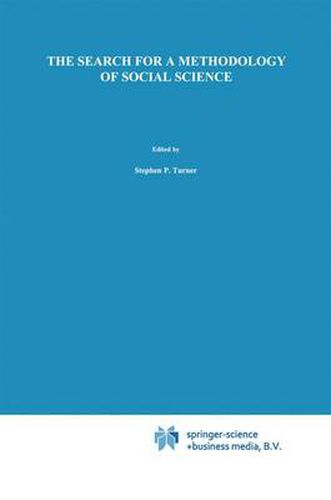Readings Newsletter
Become a Readings Member to make your shopping experience even easier.
Sign in or sign up for free!
You’re not far away from qualifying for FREE standard shipping within Australia
You’ve qualified for FREE standard shipping within Australia
The cart is loading…






This title is printed to order. This book may have been self-published. If so, we cannot guarantee the quality of the content. In the main most books will have gone through the editing process however some may not. We therefore suggest that you be aware of this before ordering this book. If in doubt check either the author or publisher’s details as we are unable to accept any returns unless they are faulty. Please contact us if you have any questions.
Stephen Turner has explored the ongms of social science in this pioneering study of two nineteenth century themes: the search for laws of human social behavior, and the accumulation and analysis of the facts of such behavior through statistical inquiry. The disputes were vigorously argued; they were over questions of method, criteria of explanation, interpretations of probability, understandings of causation as such and of historical causation in particular, and time and again over the ways of using a natural science model. From his careful elucidation of John Stuart Mill’s proposals for the methodology of the social sciences on to his original analysis of the methodological claims and practices of Emile Durkheim and Max Weber, Turner has beautifully traced the conflict between statistical sociology and a science offactual description on the one side, and causal laws and a science of nomological explanation on the other. We see the works of Comte and Quetelet, the critical observations of Herschel, Buckle, Venn and Whewell, and the tough scepticism of Pearson, all of these as essential to the works of the classical founders of sociology. With Durkheim’s essay on Suicide and Weber’s monograph on The Protestant Ethic, Turner provides both philosophical analysis to demonstrate the continuing puzzles over cause and probability and also a perceptive and wry account of just how the puzzles of our late twentieth century are of a piece with theirs. The terms are still familiar: reasons vs.
$9.00 standard shipping within Australia
FREE standard shipping within Australia for orders over $100.00
Express & International shipping calculated at checkout
This title is printed to order. This book may have been self-published. If so, we cannot guarantee the quality of the content. In the main most books will have gone through the editing process however some may not. We therefore suggest that you be aware of this before ordering this book. If in doubt check either the author or publisher’s details as we are unable to accept any returns unless they are faulty. Please contact us if you have any questions.
Stephen Turner has explored the ongms of social science in this pioneering study of two nineteenth century themes: the search for laws of human social behavior, and the accumulation and analysis of the facts of such behavior through statistical inquiry. The disputes were vigorously argued; they were over questions of method, criteria of explanation, interpretations of probability, understandings of causation as such and of historical causation in particular, and time and again over the ways of using a natural science model. From his careful elucidation of John Stuart Mill’s proposals for the methodology of the social sciences on to his original analysis of the methodological claims and practices of Emile Durkheim and Max Weber, Turner has beautifully traced the conflict between statistical sociology and a science offactual description on the one side, and causal laws and a science of nomological explanation on the other. We see the works of Comte and Quetelet, the critical observations of Herschel, Buckle, Venn and Whewell, and the tough scepticism of Pearson, all of these as essential to the works of the classical founders of sociology. With Durkheim’s essay on Suicide and Weber’s monograph on The Protestant Ethic, Turner provides both philosophical analysis to demonstrate the continuing puzzles over cause and probability and also a perceptive and wry account of just how the puzzles of our late twentieth century are of a piece with theirs. The terms are still familiar: reasons vs.